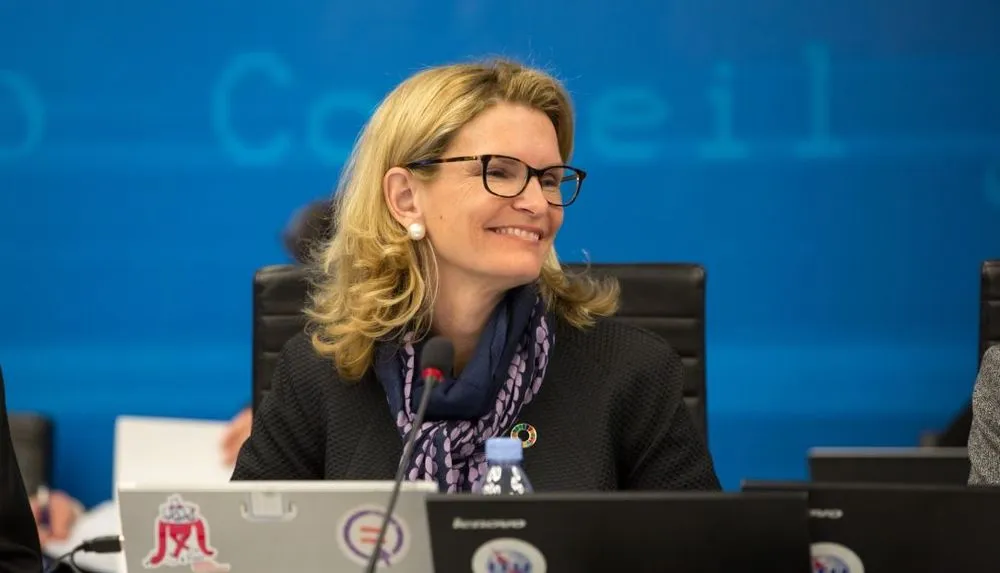US candidate defeats Russian rival to head UN tech agency
Amid the backdrop of the war in Ukraine, and a battle for the future of the internet, the American contender to lead the United Nations telecommunications agency has defeated their Russian rival by a surprising landslide vote.
Despite anxieties about the direction of the vote on Thursday, Doreen Bogdan-Martin won by a wide margin, receiving 139 votes in the secret ballot to Rashid Ismailov’s 25. She will begin her four-year term as the International Telecommunication Union’s new Secretary-General on January 1, 2023.
To put her victory in context, the last contested election for Secretary-General was in 2006, when Mali's candidate defeated Germany's by 95 votes to 60.
Immensely proud to be the first woman ever elected to the post of @ITU Secretary-General.
— Cosmas Zavazava (@ITUBDTDirector) September 29, 2022
We've finally smashed a 157-y.o. glass ceiling! – and I hope this result inspires women & girls everywhere to dream big & make those dreams a reality!#Plenipot pic.twitter.com/138WfX74fK
Bogdan-Martin’s campaign was based on her 28 years of work at the ITU. She was “a known quantity, a deeply-respected career ITU person,” Emily Taylor, an associate fellow with Chatham House, told The Record. She had received endorsements from a wide range of political figures in the U.S., including President Joe Biden.
Although the American campaign did not explicitly criticize Russia over the invasion of Ukraine, Bogdan-Martin hinted towards it in her victory speech, mentioning “escalating conflicts” as being among the “significant challenges” facing the world, alongside her priority of extending connectivity to the 2.7 billion people globally who do not yet have stable internet access.
The United Kingdom’s ambassador to Geneva, Simon Manley, told the Inside Geneva podcast last week that while the U.K. believed it was “not the right moment to see Russians elected to top positions, when Putin’s regime is flouting international law and flouting the charter” the ITU election was “not about the U.S. v Russia”.
The basis on which the U.K. (alongside the U.S. and Russia) wished for the contest to instead be fought about the merits of two competing visions for the future of the governance of the internet.
In general the West would like to see the internet remain governed in a multilateral way, involving stakeholders and non-government organizations like ICANN [Internet Corporation for Assigned Names and Numbers] — in contrast to the “top-down” increased role that governments would have in the vision that has been put forward by Russia and China.
The impact of Russia’s invasion of Ukraine on the vote in Bucharest, Romania, is unknown – very few delegates openly discuss who they are going to vote for or why – but an angry statement issued by Russian Foreign Ministry spokeswoman Maria Zakharova a week before the vote may have contributed to Ismailov’s defeat.
His pre-election plans were inconvenienced when the Romanian Embassy in Moscow withdrew 14 visas that had been issued to members of the Russian delegation, describing the individuals as “a threat to national security.”
More than half of the Russian delegation was still able to attend to engage in the normal pre-election events, including a reception, and while the impact may have been a very small embarrassment and inconvenience for Russia, it was not expected to severely influence the vote.
However, Zakharova’s furious statement in response broke almost all of the unspoken rules of engagement that had been observed during the campaign so far. She alleged the visa withdrawals were part of a Washington-led conspiracy — undermining the purposeful blandness and de-politicised approach of Ismailov’s campaign brochure — and explicitly accused the American candidate of being prepared to “push Western installations in the ITU to the detriment of users of the rest of the world” – implicitly suggesting that the Russian government viewed the role of Secretary-General as one of significant political influence.
Following the vote in Bucharest on Thursday, Robert Collett, a former British diplomat and associate fellow at Chatham House, tweeted it was “interesting” that the Russian candidate received only 25 votes as — given normal UN votes — there are 30 countries which persistently vote in the same way. He said this showed that Russia “struggled to mobilize its like-minded group yet alone [the group in] the middle-ground.”
The ITU election showed a very significant commitment in one direction, but it remains to be seen whether that is based on a growing appreciation for the multilateral stakeholder-led approach to internet governance or simply an aversion to Russia.
Alexander Martin
is the UK Editor for Recorded Future News. He was previously a technology reporter for Sky News and a fellow at the European Cyber Conflict Research Initiative, now Virtual Routes. He can be reached securely using Signal on: AlexanderMartin.79



